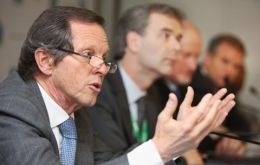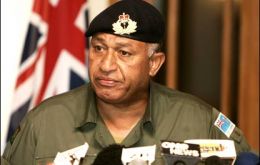MercoPress. South Atlantic News Agency
International
-
Thursday, September 3rd 2009 - 03:26 UTC
BP announces giant deep oil discovery in the Gulf of Mexico

British Petroleum announced Wednesday a giant oil discovery at its Tiber Prospect in the deepwater Gulf of Mexico. The well, located in Keathley Canyon block 102, approximately 400 kilometres south east of Houston, is in 1,259 metres of water.
-
Thursday, September 3rd 2009 - 03:21 UTC
Falklands on route map for 2010 Games in India Queen’s Baton relay

Britain’s Queen Elizabeth II is to launch a baton relay – one of the longest in history – in the presence of Indian President Pratibha Patil to lift the curtain on the 2010 Commonwealth Games in Delhi, organizers announced this week.
-
Wednesday, September 2nd 2009 - 13:12 UTC
Gibraltar signs information exchange agreements to boost tax transparency

Gibraltar Chief Minister Peter Caruana signed a tax information exchange agreement (TIEA) with the UK which is set to boost levels of transparency on tax-related issues, reports the Gibraltar Chronicle.
-
Wednesday, September 2nd 2009 - 07:49 UTC
China confirms stimulus and credit policies to prop economy

Chinese top leaders reaffirmed on Tuesday the country’s stimulus program and easy credit policy following one of the worst monthly performances of the Shanghai and Shenzhen markets fearing recovery efforts could be loosing steam.
-
Wednesday, September 2nd 2009 - 07:41 UTC
Euro zone record in July: 15.1 million jobless

Unemployment in the 16-member Euro zone hit a 10-year high in July, data released Tuesday showed. EU statistics office Eurostat said that another 167,000 people were unemployed in the Euro zone during July, pushing the jobless rate up to 9.5% from 9.4% in June which takes the total to 15.1 million people.
-
Wednesday, September 2nd 2009 - 07:35 UTC
IATA: air transport sector a “disaster”; airlines set to loose 9 billion USD

”The global situation of the air transport sector is a disaster” said Giovanni Bisignani, IATA’s Director General and CEO in a speech to JURCA, the association of airlines operating in Argentina.
-
Wednesday, September 2nd 2009 - 07:23 UTC
Terrorist suspect to be confirmed as Iranian Defence minister

Iranian MPs have strongly backed the defence minister-designate, in defiance of Argentine demands for his arrest over a 1994 bombing in Buenos Aires. Ahmad Vahidi faced no opposition from MPs on the third day of a debate on President Mahmoud Ahmadinejad's choices for his new cabinet.
-
Wednesday, September 2nd 2009 - 07:16 UTC
Penny-saving Brits in July pay back more than they borrow

The amount of debt Britons owe fell for the first time since records began during July, figures show. People repaid £635 million more than they borrowed during the month, reducing outstanding lending to £1.456 trillion.
-
Wednesday, September 2nd 2009 - 07:13 UTC
Commonwealth fully suspends Fiji for refusing to call elections

The Commonwealth has fully suspended Fiji after it refused to bow to demands to call elections by next year. Secretary General Kamalesh Sharma cited the Pacific island country's lack of progress towards democracy.
-
Wednesday, September 2nd 2009 - 07:01 UTC
Chinese company moves heavily into Canadian oil sands

PetroChina plans to acquire a majority stake in Canada’s Athabasca Oil Sands which holds the largest lease in Alberta’s oil sands. The 1.7 billion US dollars deal with Asia’s largest oil company means taking control of 60% of the 1.3 million acres of oil sand leases held by Athabasca.
